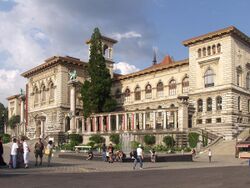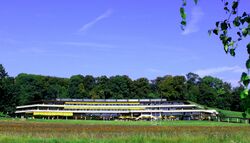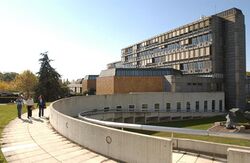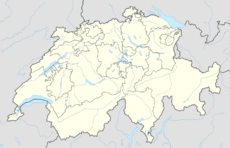Organization:University of Lausanne
Université de Lausanne | |
 | |
| Latin: Schola Lausannensis | |
| Motto | Le savoir vivant |
|---|---|
Motto in English | Live knowledge |
| Type | Public university |
| Established | 1537 |
| Rector | Frédéric Herman (since August 2021) |
Administrative staff | 3,700 (2014) |
| Students | 13,500 (2014) |
| Undergraduates | 8,066 (2010) |
| Postgraduates | 1,370 (2010) |
| 1,583 (2010) | |
| Address | Université de Lausanne, 1015 Lausanne, Suisse , , Vaud , [ ⚑ ] : 46°31′21″N 6°34′46″E / 46.5225°N 6.57944°E |
| Affiliations | EUA, AUF, UNICA |
| Website | www.unil.ch |
The University of Lausanne (UNIL; French: Université de Lausanne) in Lausanne, Switzerland was founded in 1537 as a school of theology, before being made a university in 1890. The university is the second oldest in Switzerland, and one of the oldest universities in the world to be in continuous operation. As of fall 2017, about 15,000 students and 3,300 employees study and work at the university. Approximately 1,500 international students attend the university (120 nationalities), which has a wide curriculum including exchange programs with world-renowned universities.
Since 2005, the university follows the requirements of the Bologna process. The 2011 Times Higher Education World University Rankings[1] ranked the University of Lausanne 116th globally. The CWTS Leiden Ranking 2015 ranks the University of Lausanne 11th in Europe and 41st globally, out of 750 universities.[2]
Together with the École polytechnique fédérale de Lausanne (EPFL) the university forms a vast campus at the shores of Lake Geneva.
History


The university was founded in 1537 as the Schola Lausannensis, one year after Bern conquered the territory of Vaud from the Duchy of Savoy. At the time it was a school of theology with the purpose of training pastors for the church.[3] It enjoyed great renown for being the first and, until the establishment of the Academy of Geneva in 1559, the only French language Protestant school of theology. In its early years it became a center of humanist learning, with thinkers such as Corderius and Celio Secondo Curione among its professors.[3] In the 17th century it became known as the Academy of Lausanne (Académie de Lausanne).[3] As the centuries passed, the number of faculties increased and diversified until, in 1890, the Academy received the name and status of a university.
In 1909, Rudolphe Archibald Reiss founded the first school of forensic science in the world: the Institut de police scientifique.
From 1970, the university moved progressively from the old centre of Lausanne, around the Cathedral and Château, to its present site at Dorigny.
The end of the 20th century witnessed the beginnings of an ambitious project aiming at greater co-operation and development among the French-speaking universities of Lausanne, Geneva, and Neuchâtel, together with the Swiss Federal Institute of Technology in Lausanne (EPFL). Among others, this led to the transfer of the sections of Mathematics, Physics and Chemistry from the university to the EPFL; the funds that were made available following this transfer were invested in the development of the life sciences at the university, including the creation of a Center for Integrative Genomics.
In 2003, two new faculties were founded, concentrating on the life and human sciences: the Faculty of Biology and Medicine and the Faculty of Geosciences and Environment.
On 1 January 2014, the Swiss Graduate School of Public Administration (IDHEAP) was integrated into the University of Lausanne.[4]
Since August 2021, the rector of the University of Lausanne is Frédéric Herman; before then, the university was led by Nouria Hernandez (2016-2021) and by Dominique Arlettaz (2006-2016).
Faculties and schools
The University of Lausanne comprises seven faculties:
- Faculty of Arts
- Faculty of Biology and Medicine (FBM)
- Faculty of Business and Economics (HEC), also called HEC Lausanne
- Faculty of Geosciences and Environment (GSE)
- Faculty of Law, Criminal Justice and Public Administration (FDSC), including the Swiss Graduate School of Public Administration
- Faculty of Social and Political Sciences (SSP)
- Faculty of Theology and Religious Studies (FTSR)
The University of Lausanne also comprises schools and different sections, including but not limited to:
- School of Criminal Justice (ESC)
- School of French as a Foreign Language (EFLE)
- French summer and winter courses (Cours de vacances)
- Science-Society Interface
Campus
Main campus
The main campus is presently situated outside the city of Lausanne, on the shores of Lake Léman, in Dorigny. It is adjacent to the Swiss Federal Institute of Technology in Lausanne (EPFL) and is served by the Lausanne Metro Line 1 (M1). The two schools together welcome about 20,000 students.
The UNIL and the EPFL share an active sports centre located on the campus, on the shores of Lake Geneva[5] and their campus is also equipped with a bicycle sharing system.[6]
The university campus is made up of individual buildings with a park and arboretum in between. The university library also serves as eating hall and is centrally located. The view from the library across the sports fields to the lake of Geneva and the French and Swiss Alps. On a clear day, Mont Blanc can be seen.
The Swiss Institute of Comparative Law and the central administration of the Swiss Institute of Bioinformatics are also located on the main campus.
-
The main building of the Faculty of Law and Criminal Justice and of the Faculty of Business and Economics.
-
The Extranef building.
-
The Édouard Fleuret Library pavilion.
-
The Génopode building of the University of Lausanne hosts the Center for Integrative Genomics of the University of Lausanne and the central administration of the Swiss Institute of Bioinformatics.
-
The School of Criminal Justice of the UNIL is the world oldest school of forensic science and is one of the only European institution to offer a complete education in forensic sciences.
-
The Anthropole building.
-
Unithèque building houses one of the two sites of the Cantonal and University Library of Lausanne on the main campus of the UNIL
-
The Swiss Institute of Comparative Law, on the campus of the University of Lausanne.
-
The Géopolis building: Faculty of Geosciences and Environment and Faculty of Social and Political Sciences
-
Vortex building, student residence on the campus
Other sites
In addition to its main campus at the lakeside, the University of Lausanne also has other sites. The Faculty of Biology and Medicine is also located in two other sites: around the University Hospital of Lausanne (CHUV) (site called Bugnon) and in Épalinges (to the north of Lausanne).
The Department of Biochemistry, the Ludwig Cancer Research branch of the University of Lausanne and the WHO Immunology Research and Training Centre and some laboratories of the University Hospital of Lausanne are located in Épalinges. The Biopôle was built next to the Épalinges campus. The Faculty of Biology and Medicine also comprises a fourth site, the Psychiatric Hospital of Cery, in Prilly.
-
Bugnon 21, headquarters of the University Hospital of Lausanne and of the deanship of the Faculty of Biology and Medicine.
-
The Center for Immunology and Infection Lausanne (CIIL), UNIL-CHUV, in Épalinges (2007).
Associated institutions


- Biopôle
- Kurt Bösch Institute (IUKB)
- Center for Biomedical Imaging (CIBM)[7]
- Centre de recherches sur les lettres romandes (CRLR)
- Centre du droit de l'entreprise (CEDIDAC)
- Centre for Advanced Modelling Science (CADMOS)[8]
- École romande de santé publique (ERSP)
- Fondation Edouard Fleuret (FEF)
- Institut Benjamin Constant (IBC)
- Institut romand des sciences bibliques (IRSB)
- Institut universitaire romand de santé au travail (IST)[9]
- International Academy of Sport Science and Technology (AISTS)
- International Institute for Management Development (IMD)
- Jean Monnet Foundation for Europe
- Jules Gonin Eye Hospital
- Ludwig Cancer Research
- Swiss Cancer Centre
- Swiss Centre of Expertise in the Social Sciences
- Swiss Institute of Bioinformatics (SIB)
- Swiss Institute of Comparative Law
- Swiss Institute for Experimental Cancer Research (ISREC)
- Swiss School of Archaeology in Greece
- Swiss Vaccine Research Institute[10]
- University Centre of Legal Medicine (CURML)[11]
- WHO Immunology Research and Training Centre
Reputation and rankings
| University rankings | |
|---|---|
| Global – Overall | |
| ARWU World[12] | 100-150 (2019) |
| CWUR World[13] | 146 (2018-19) |
| CWTS World[14] | 84 (2018) |
| QS World[15] | 149 (2019) |
| RUR World[16] | 50 (2019) |
| THE World[17] | 152 (2018) |
| USNWR Global[18] | 179 (2018) |

The Leiden Ranking of the University of Leiden, when ranking universities by the proportion of publications (all sciences) of a university belonging to the top 10% of their field among universities worldwide, ranked the University of Lausanne as follows:
| Year | In Switzerland | In Europe | In the World |
|---|---|---|---|
| 2015-2018 | 5 | 35 | 98 |
| 2014-2017 | 6 | 38 | 108 |
| 2013-2016 | 6 | 28 | 90 |
| 2012-2015 | 6 | 34 | 99 |
| 2011-2014 | 4 | 22 | 73 |
| 2010-2013 | 4 | 15 | 57 |
| 2009-2012 | 7 | 31 | 88 |
| 2008-2011 | 5 | 21 | 67 |
| 2007-2010 | 4 | 16 | 67 |
| 2006-2009 | 3 | 14 | 67 |
The Academic Ranking of World Universities [ARWU] ranked the University of Lausanne in 2016 as 101-150th in life science and medicine and 151-200th in social science.[19] The overall ranking is as follows:
| Year | In Switzerland | In Europe | In the World |
|---|---|---|---|
| 2020 | 101 - 150 | ||
| 2019 | 151 - 200 | ||
| 2018 | 101 - 150 | ||
| 2017 | 151 - 200 |
The University of Texas at Dallas Top 100 Business School Research Rankings ranked the Faculty of Business & Economics of the University of Lausanne (HEC Lausanne) as follows:
| Period | In Switzerland | In Europe | In the World |
|---|---|---|---|
| 2004-2008 | 1st | 9th | 112th |
| 2003-2007 | 1st | 8th | 103rd |
| 2002-2006 | 1st | 8th | 123rd |
| 2001-2005 | 1st | 14th | 149th |
| 2000-2004 | 1st | 20th | 186th |
According to the Times Higher Education World University Rankings, the University ranked 62nd in life sciences worldwide (4th in Switzerland) in 2017.[20] The overall rankings[1] are as follows:
| Year | In Switzerland | In Europe | In the World |
|---|---|---|---|
| 2016-2017 | 7th | ? | 151nd |
| 2013-2014 | 6th | 54th | 132nd |
| 2012-2013 | 4th | 51st | 130th |
| 2011-2012 | 6th | 41st | 116th |
| 2010-2011 | 6th | 44th | 136th |
The QS World University Rankings[21] ranked the University of Lausanne 96th in life science and medicine[22] with the overall rankings as follows:
| Year | In Switzerland | In Europe | In the World |
|---|---|---|---|
| 2016 | - | - | 138th |
| 2015 | - | - | 143th |
| 2014 | - | - | 105th |
| 2013 | 6th | - | 111th |
| 2012 | 6th | - | 115th |
The THE-QS World University Rankings (in 2010 Times Higher Education World University Rankings and QS World University Rankings parted ways to produce separate rankings) ranked the University of Lausanne as follows:
| Year | In Switzerland | In Europe | In the World |
|---|---|---|---|
| 2009 | 6th | - | 168th |
| 2008 | 6th | 64th | 161st |
| 2007 | 7th | 93rd | 217th |
| 2006 | 5th | - | 89th |
| 2005 | 6th | - | 133rd |
The Leiden Ranking of the University of Leiden, when ranking universities by the size-independent, field-normalized average impact of their research publications (CPP/FCSm) among the 250 largest universities worldwide, ranked the University of Lausanne as follows:
| Year | In Switzerland | In Europe | In the World |
|---|---|---|---|
| 2010 | 3rd | 5th | 45th |
| 2008 | 3rd | 6th | 73rd |
The Leiden Ranking of the University of Leiden, when ranking universities by citations-per-publication (CPP) among the 250 largest universities worldwide, ranked the University of Lausanne as follows:
| Year | In Switzerland | In Europe | In the World |
|---|---|---|---|
| 2010 | 1st | 1st | 22nd |
| 2008 | 1st | 1st | 31st |
4 International Colleges & Universities [4icu.org] ranked the popularity of the website of the University of Lausanne as follows:
| Year | In Switzerland | In Europe | In the World |
|---|---|---|---|
| 2009 | 5th | 15th | 45th |
Press
The UNIL publish free monthly campus magazine entitled L'Uniscope[23] The UNIL also publish Allez savoir !,[24] a free magazine aimed at a larger audience (general public), in January, May, and September.
Besides these, L'auditoire is the students' newspapers from both UNIL and EPFL, with a circulation of 19,000 free copies.
Alumni
ALUMNIL network
In 2011, an on-line network of the UNIL alumni, called ALUMNIL, was created.[25] Since then, regular events (throughout the year) and an annual party (in autumn) are organised every year for the alumni.
Royalty
- King Ananda Mahidol (Rama VIII) of Thailand (1925-1946)
- King Bhumibol Adulyadej (Rama IX) of Thailand (1927-2016)
- Princess Galyani Vadhana of Thailand
- Prince Bernhard of the Netherlands
- Princess Vera Ignatievna Giedroyc, Lithuanian princess and Russian-Ukrainian surgeon
Politics
- Ignazio Cassis, member of the Swiss Federal Council
- İsmail Cem, Minister of Foreign Affairs of Turkey
- Paul Ceresole, President of the Swiss Confederation
- Georges-André Chevallaz, President of the Swiss Confederation
- Pascal Couchepin, President of the Swiss Confederation
- Ernest Chuard, President of the Swiss Confederation
- Jean-Pascal Delamuraz, President of the Swiss Confederation
- Vedat Dicleli, Minister of Economy & Trade of Turkey
- Daniel-Henri Druey, President of the Swiss Confederation
- Florika Fink-Hooijer, prominent European civil servant
- Constant Fornerod, President of the Swiss Confederation
- Şemsettin Günaltay, Prime Minister of Turkey
- Max Huber, Swiss international lawyer and diplomat, President of the International Committee of the Red Cross* Antoine Louis John Ruchonnet, President of the Swiss Confederation
- Fazıl Küçük, first Vice President of the Republic of Cyprus
- Pascoal Mocumbi, Prime Minister of Mozambique
- Benito Mussolini, Prime Minister of Italy, Duce of Fascism
- Marcel Pilet-Golaz, President of the Swiss Confederation
- Eugène Ruffy, President of the Swiss Confederation
- Marc-Emile Ruchet, President of the Swiss Confederation
- Mohammad Sa'ed, Prime Minister of Iran
- Jonas Savimbi, leader of UNITA, an anti-Communist rebel group in Angola
- Lutz Graf Schwerin von Krosigk, Leading Minister of the German Reich
Business
- Jean-Claude Biver, CEO of Hublot
- Louis C. Camilleri, CEO of Philip Morris International
- Jean Claude Gandur, CEO of Addax Petroleum[26]
Literature
- Philippe Jaccottet, Swiss poet
- Mohammad-Ali Jamalzadeh, prominent Iranian writer
- Edmond Pidoux, Swiss poet and novelist
- Charles Ferdinand Ramuz, Swiss writer
Scholars
- Jacques Dubochet (1942-), biophysicist and co-laureate of the Nobel Prize in Chemistry 2017.
- Pierre Gilliard (1879-1962), French professor, Legion of Honour recipient
- Leo Aryeh Mayer (1895-1959), rector of the Hebrew University of Jerusalem.
- Vilfredo Pareto (1848–1923) Economist, engineer, sociologist, philosopher, Professor of Economics at University of Lausanne, co-founder of the Lausanne School of economics, together with Léon Walras
- Jean Piccard (1884-1963), Swiss-born American chemist, engineer, professor and high-altitude balloonist.
- Martine Rebetez (1961-), Swiss climatologist
- Georges de Rham (1903-1990), Swiss mathematician, known for his contributions to differential topology.
- Pedro Rossello (1897-1970), Catalonian educator and Deputy Director of the International Bureau of Education.
- Jean de Serres (1540-1598), French humanist, Plato translator, Calvinist.
- Léon Walras (1834–1910) Economist, Professor of Economics at University of Lausanne, co-founder of the Lausanne School of economics, together with: Vilfredo Pareto
- Luc E. Weber (1941-), Rector Emeritus of the University of Geneva
- Alexandre Yersin (1863-1943), Swiss-French physician, co-discoverer of the bacillus responsible for the bubonic plague.
- Zaharina Dimitrova (1873-1940), Bulgarian doctor, Order of Civil Merit recipient, philanthropist.
Others
- Sepp Blatter, President of FIFA
- Abraham Davel, independence hero of the Canton of Vaud
- Akbar Etemad, president of the Atomic Energy Organisation of Iran
- Christophe Keckeis, Head of the Swiss Army
- Claude Nicollier, Swiss astronaut
- Bertrand Piccard, Swiss psychiatrist and balloonist
- Nikolaus Senn (1926–2014), co-director of Schweizerische Bankgesellschaft
School of Lausanne
Neoclassical school of thought in economics founded at the University of Lausanne by two of its professors: Léon Walras and Vilfredo Pareto. The School of Lausanne is associated with the development of general equilibrium theory as well as the marginalist revolution.
See also
- Charles Guillaume Loys de Bochat
- List of largest universities by enrollment in Switzerland
- List of modern universities in Europe (1801–1945)
- List of universities in Switzerland
- Cantonal and University Library of Lausanne
- International Academy of Sport Science and Technology (AISTS)
- Jean Monnet Foundation for Europe
- Swiss School of Archaeology in Greece
- University Hospital of Lausanne (CHUV)
Notes and references
- ↑ 1.0 1.1 "World University Rankings". 13 April 2015. https://www.timeshighereducation.com/world-university-rankings/2011/world-ranking.
- ↑ "CWTS Leiden Ranking". http://www.leidenranking.com/.
- ↑ 3.0 3.1 3.2 Nicole Meystre-Schaeren. "Université de Lausanne" (in fr). Historical Dictionary of Switzerland.
- ↑ Rapport annuel 2012 de l'Université de Lausanne, www.unil.ch (page visited on 30 May 2013).
- ↑ Service des sports UNIL-EPFL, sport.unil.ch (page visited on 10 May 2013).
- ↑ Campus roule, www.publibike.ch (page visited on 15 May 2013).
- ↑ Center for Biomedical Imaging (page visited on 2 October 2011).
- ↑ CADMOS (page visited on le 20 February 2012).
- ↑ Institut universitaire romand de santé au travail (page visited on 1 October 2011).
- ↑ Swiss Vaccine Research Institute (page visited on 14 April 2012).
- ↑ Centre universitaire romand de médecine légale (page visited on 3 June 2012).
- ↑ "Academic Ranking of World Universities 2019". Shanghai Ranking Consultancy. http://www.shanghairanking.com/ARWU2019.html.
- ↑ "World University Rankings 2018-19" (in en). Center for World University Rankings. https://cwur.org/2018-19.php.
- ↑ "CWTS Leiden Ranking 2018 - PP top 10%". CWTS Leiden Ranking. https://www.leidenranking.com/ranking/2018/list.
- ↑ "QS World University Rankings 2019". Quacquarelli Symonds Ltd.. https://www.topuniversities.com/university-rankings/world-university-rankings/2019.
- ↑ "Round University Ranking of World Universities 2019". RUR Rankings Agency. https://roundranking.com/ranking/world-university-rankings.html#world-2019.
- ↑ "World University Rankings 2018" (in en). Times Higher Education (THE). https://www.timeshighereducation.com/world-university-rankings/2018/world-ranking#!/page/0/length/-1/sort_by/rank/sort_order/asc/cols/stats.
- ↑ "Best Global Universities Rankings (2018)" (in en). U.S. News Education. https://www.usnews.com/education/best-global-universities/rankings.
- ↑ "Academic Ranking of World Universities in Life and Agriculture Sciences - 2016 | 2016 Top 100 Universities in Natural Sciences and Mathematics | ARWU-FIELD 2016". http://www.shanghairanking.com/FieldLIFE2016.html.
- ↑ "World University Rankings 2016-2017 by subject: life sciences". 20 September 2016. https://www.timeshighereducation.com/world-university-rankings/2017/subject-ranking/life-sciences.
- ↑ "QS World University Rankings 2010 Results". http://www.topuniversities.com/university-rankings/world-university-rankings/2010/results.
- ↑ "QS World University Rankings by Faculty 2015/16 - Life Sciences and Medicine". https://www.topuniversities.com/university-rankings/faculty-rankings/life-sciences-and-medicine/2015.
- ↑ "Archives de l'uniscope". https://www.unil.ch/unicom/fr/home/menuinst/publications/uniscope/archives-de-luniscope.html.
- ↑ Allez savoir !
- ↑ ALUMNIL, www.unil.ch (page visited on 1 November 2013).
- ↑ "Jean Claude Gandur". http://fg-art.org/en/jeanclaudegandur.html.
Bibliography
- (in French) Jean-Philippe Leresche, Frédéric Joye-Cagnard, Martin Benninghoff and Raphaël Ramuz, Gouverner les universités. L'exemple de la coordination Genève-Lausanne (1990-2010), Presses polytechniques et universitaires romandes, 2012 (ISBN 9782880749316).
- (in French) Nadja Maillard, L'Université de Lausanne à Dorigny, Éditions Infolio, 488 pages, 2013 (ISBN 978-2-88474-280-1).
External links
- (in French) Cantonal and University Library of Lausanne













